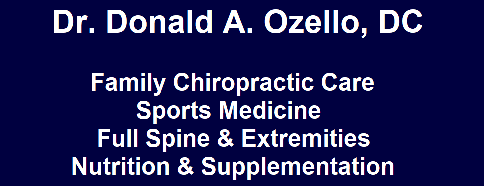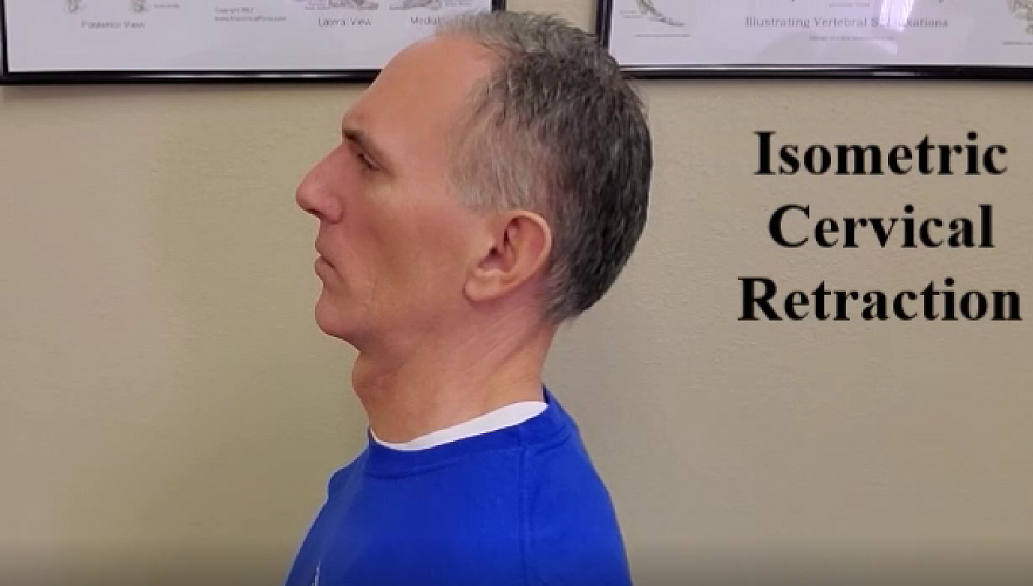Develop powerful neck muscles with manual and banded cervical spine strengthening exercises. Strengthen the cervical paraspinals, trapezius, levator scapula, scalenes, sternocleidomastoids and deep cervical flexors. The cervical spine is medical terminology for the neck. Strong cervical spine muscles may help decrease the risk of concussions and post-concussion syndrome. Perform each exercise slowly through a symptom free range of motion.
Isometric Cervical Retraction: Fundamental exercise that improves upper body posture and decreases forward head carriage.
Sit or stand in good posture and pull your shoulder blades back.
Maintain your head in a neutral position. Do not tilt your head forward or backward.
Move your head straight backwards.
Hold this position for two to six seconds then slowly return to starting point.
Build to fifteen repetitions of this isometrics exercise to strengthen the deep cervical flexors, correct poor posture, rehab neck injuries, prevent cervical spine injuries and help prevent concussions and post-concussion syndrome.
Kneel in good posture. Keep thoracic spine straight through entire exercise.
With both hands behind the back, tightly hold the band.
Band secured to both sides of neck harness.
Extend neck as far as possible through a pain free range of motion. This is the starting position.
Flex neck as far as possible through a pain free range of motion.
Slowly return to starting position by controlling the eccentric motion.
Move in a slow and controlled manner through a pain free range of motion.
Build to fifteen reps.
Knees and palms on floor. Palms should be close to knees.
Band securely under both palms.
Band secured to both sides of neck harness.
Keep thoracic spine straight through entire exercise.
Flex neck as far as possible through a pain free range of motion. This is the starting position.
Extend neck as far as possible through a pain free range of motion.
Slowly return to starting position by controlling the eccentric motion.
Move in a slow and controlled manner through a pain free range of motion.
Build to fifteen reps.
Banded Cervical Lateral Flexion
Stand, sit or kneel in good posture.
Keep thoracic spine straight through entire exercise.
Band secured to front and back of neck harness.
To perform left lateral flexion. With right arm, securely hold the band at arm’s length at height of attachment to head harness. Right hand should be out to the right side and in line with the shoulder.
Laterally flex neck to right as far as possible through a pain free range of motion. This is the starting position.
Laterally flex neck to left as far as possible through a pain free range of motion.
Slowly return to starting position by controlling the eccentric motion.
Move in a slow and controlled manner through a pain free range of motion.
Build to fifteen reps.
Repeat to opposite direction.
Stand, sit or kneel in good posture. Keep thoracic spine straight through entire exercise.
Band secured to front and back of neck harness.
To perform left rotation. With right arm, securely hold the band at arm’s length at height of attachment to head harness. Right hand should be out to the right side and slightly posterior to the shoulder.
Rotate neck to right as far as possible through a pain free range of motion. This is the starting position. Make sure there is tension in the band at the starting position.
Rotate neck to left as far as possible through a pain free range of motion.
Slowly return to starting position by controlling the eccentric motion.
Move in a slow and controlled manner through a pain free range of motion.
Build to fifteen reps.
Repeat to opposite direction.
Develop neck strength to correct upper cross syndrome, enhance function, lower the potential of cervical disc herniations and burners/stingers, and rehab neck injuries such as cervical sprain/strains and cervical radiculopathies. Train hard and train smart to build a powerful neck.
References
Cervical Spondylosis
https://www.ncbi.nlm.nih.gov/books/NBK551557/
The Best Exercises for A Thicker, Stronger Neck
https://fitnessvolt.com/best-neck-exercises/
Effect of Neck Muscle Strength and Anticipatory Cervical Muscle Activation on the Kinematic Response of the Head to Impulsive Loads https://www.ncbi.nlm.nih.gov/pmc/articles/PMC4344320/
Potential Role of the Cervical Spine in Sports-Related Concussion: Clinical Perspectives and Considerations for Risk Reduction https://www.ncbi.nlm.nih.gov/pmc/articles/PMC7102493/
Disclaimer: Viewing this video does not take the place of seeing a medical professional, receiving proper training in the medical profession or working with a fitness professional. Please visit a medical professional for evaluation, diagnosis and treatment. Please work with a fitness professional to learn proper exercise technique and to develop a proper training program. Never perform an exercise that elicits or intensifies symptoms. If an exercise elicits or intensifies symptoms, stop immediately and use a viable substitute. Please receive proper medical training before attempting these medical procedures.
Dr Donald A Ozello DC of Championship Chiropractic in Las Vegas, NV
Web Site: http://www.championshipchiropractic.com/
Blog: https://www.championshipchiropractic.com/wordpress/
Twitter: https://twitter.com/drdozellodc
Facebook: https://www.facebook.com/Championship-Chiropractic-280141628688300/
LinkedIn: https://www.linkedin.com/in/dr-donald-a-ozello-dc-716b3233
YouTube: https://www.youtube.com/user/drdozellodc/videos
“Running: Maximize Performance & Minimize Injuries” https://www.amazon.com/Running-Performance-Chiropractors-Minimizing-Potential/dp/1493618741

